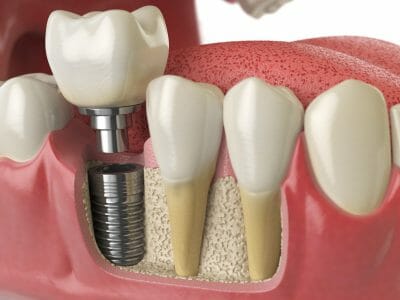Dental Implants
 What Are Dental Implants?
What Are Dental Implants?
Dental implants are small titanium screws that are fused directly to the jawbone to replace the roots of missing teeth. Titanium is a biocompatible material that is used widely in the medical field in procedures such as joint replacement surgeries.
For patients who are missing one or more teeth and want to replace those teeth, dental implants provide the most permanent solution. Dental implants are safe, durable, comfortable, attractive, and function just like natural teeth.
How are dental implants put in place?
The process of implanting dental implants takes about six to eight months from the beginning to the end of the procedure. Dr. Harding will refer you to a trusted oral surgeon to perform the first phase of the procedure.
This first phase involves surgically attaching the bottom portion of the titanium implant directly to your jawbone. This bottom portion remains below the gum line while a small segment remains above the gum line.
Over a period of three to six months, the bottom portion of the implant will gradually fuse with your jawbone. During this period, you may wear temporary dentures if required and maintain a soft diet to avoid exerting pressure on your new implants as they heal.
Once you have fully healed from the implant surgery and the implant has fused to the jaw bone, a small healing collar will be attached to the implants and Dr. Harding can begin crafting your new teeth, using an impression taken of your gum line.
A post will be mounted onto the top portion of the implant that protrudes slightly above the gum line and a new crown will be mounted onto that post. This crown will replace your lost tooth. It will be permanently attached to your bone and will look and function just like a natural tooth.
Do dental implants prevent bone loss?
Yes! One of the biggest benefits of dental implants is that they not only look and function just like natural teeth, they actually prevent bone loss. In fact, according to a study published by the National Center for Biotechnology Information, they may even stimulate the growth of new bone tissue.
Do dental implants require special care?
Your implant will be covered by a new porcelain or ceramic crown. While crowns are durable and tough, they may still chip or become damaged or stained. To protect your crowns, avoid chewing on any foods or substances that might be hard enough to crack or break them. This is a precaution you should take to protect your natural teeth as well.
Your new crown will look and feel like a natural tooth and may be cared for in the same manner as your natural teeth; following a regimen of brushing at least twice daily and flossing daily, as well as getting regular dental checkups. To prevent discoloration of your crown, as well as your natural tooth enamel, avoid smoking or using tobacco products, and reduce your intake of foods and beverages that may leave stains, such as coffee, tea, and red wine.
If you’d like to repair your smile by replacing missing teeth with dental implants, contact our office today to schedule an appointment for a dental evaluation with Dr. Harding.

 What Are Dental Implants?
What Are Dental Implants?